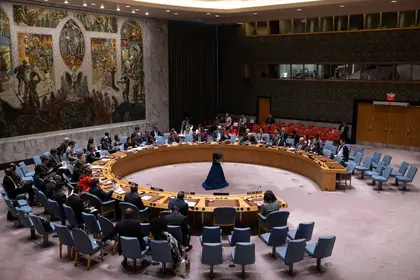Ukraine’s Foreign Ministry called for an urgent meeting of the United Nations Security Council (UNSC) on Tuesday, June 6, after what it regarded was a Russian attack on the Kakhovka dam and also demanded increased sanctions against Moscow’s missile and nuclear industry.
The Foreign Ministry statement said: “We call on the international community to resolutely condemn the Russian terrorist attack on the Kakhovka HPP [Hydroelectric Power Plant],” and also insisted a meeting with the International Atomic Energy Agency.
Most of the 17 nations’ representatives who attended the meeting shared the views expressed by Martin Griffiths, UN Under-Secretary-General for Humanitarian Affairs and Emergency Relief, that the collapse of the Kakhovka dam could prove to be the “most significant incident of damage to civilian infrastructure” since the start of Russia’s full-scale invasion of Ukraine.
“The damage caused by the dam’s destruction means that life will become intolerably harder for those already suffering from the conflict,” Griffiths said. “The consequences of not being able to deliver assistance to the millions of people affected by the flooding in these areas are potentially catastrophic.”
In spite of the handwringing by the delegates, only four of them were ready to accuse either side of responsibility. Ukraine, Poland and Latvia pointed the finger at Moscow for “yet another outrageous act of Russian barbarity.”

Drone Wars –Technology, Tactics, Strategy, Countermeasures, Legislation
The fourth, Russia’s UN Ambassador Vasily Nebenzya, tried to blame Ukraine, without providing any evidence. He accused Kyiv of destroying the dam to create “favorable opportunities” for it to regroup its military before it launched its counteroffensive.
“The deliberate sabotage undertaken by Kyiv against a critical infrastructure facility is extremely dangerous and can essentially be classified as a war crime or an act of terrorism,” Nebenzya told the council.
Ukraine’s Ambassador to the UN, Serhiy Kyslytsya, unequivocally accused Russia of carrying out the “terrorist act against critical Ukrainian infrastructure.”
An exasperated Kyslytsya said that Moscow, as usual, was trying to blame the victim for its own crimes. He reminded the UNSC that Russia had been in control of the dam for more than a year. He categorized Nebenzya as “floundering again in the mud of lies.” He went on to say: “It is physically impossible to blow it up somehow from the outside by shelling – it was mined by the Russian occupiers, and they blew it up.”
Neither the French, US nor British representatives, normally Ukraine’s staunchest supporters at the UN, were prepared to directly accuse Russia of being responsible, but called for an investigation while insisting that their support for Ukraine was unwavering.
Deputy US Ambassador, Robert Wood, stated that during the meeting that the US was “not certain” who is to blame for the collapse, but wanted to make it absolutely clear: “It was Russia that started this war. It was Russia that occupied this area of Ukraine. And it was Russian forces that took over the dam illegally last year and have been occupying ever since.”
Wood did go a little further in comments after leaving the UNSC chamber, saying: “We’re not certain at all, we hope to have more information in the coming days.
“But, I mean, come on… why would Ukraine do this to its own territory and people, flood its land, force tens of thousands of people to leave their homes – it doesn’t make sense.”
In his Tuesday night video address, the Ukrainian President Volodymyr Zelensky said “Such deliberate destruction by the Russian occupiers and other structures of the hydroelectric power station is an environmental bomb of mass destruction.”
He said that destruction of the dam would “not stop Ukraine and Ukrainians,” adding: “We will still liberate all our land. Only the complete liberation of Ukrainian land from the Russian occupiers will guarantee that there will be no more such terrorist attacks.”
En-route to Washington for his meeting with the US President, UK Prime Minister Rishi Sunak said that if the destruction of the Kakhovka dam was proven to have been an intentional act by Russian forces it would represent a “new low” in Moscow’s illegal invasion. Sunak said the UK’s military and intelligence agencies were looking into the blast but it was too soon to make a definitive judgment on who was to blame.
A French spokesman said that the partial destruction of the dam illustrates yet again the devastating consequences of the Russian Federation’s aggression. None of this would have occurred if the Russian Federation had not invaded Ukraine and if it had upheld the Charter of the United Nations.
The UNSC meeting, which was the 9,339th, was closed without a vote or any conclusions being drawn.
You can also highlight the text and press Ctrl + Enter






